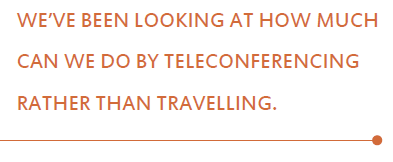Summary
With technology underpinning much of the work the CIP does around the world, Guvener discusses how that has impacted legal.
CIP is a research organisation conducting agricultural research for development in 22 countries, mainly in the global South - this means we are very much involved with the development of intellectual property. Sustainability in agriculture is a key priority for our organisation. We have reached six million households in sub-Saharan Africa with our sweet potato technologies: we distribute genetic resources so other entities can use them in developing new solutions.
We are very much a capitaliser of technological innovation in terms of agriculture. That is exactly how I see our legal department. We are a service-oriented group of lawyers using technology to support colleagues around the world to be aware of the regulatory elements that they need to be taking into consideration for the implementation of their projects. This is so they can plan, and so that nothing becomes a bottleneck. We organise our portfolio management through a system called OCS - it's based on 'Agresso'. This is where we try to automate as much as possible: in terms of creating reports, creating networks for contractual management, and timesheets. An important aspect of our work is supporting the innovation pipeline. We have contracted an external software service provider for management of our IP platform, which covers all IP management processes, from invention disclosure all the way up to licensing. As soon as our colleagues have a brilliant idea, we encourage them to disclose it internally. This triggers a review process, supported by both our legal and finance teams. Then, with approval from assigned leadership, we take all necessary protections, such as intellectual property rights. With our integrated corporate system, we can monitor how we use that technology with different development projects or whether we license it for others to use. We can measure the impact whilst we're deploying the invention for public benefit. Email almost becomes a burden when you come to the end, with a long exchange of documents from lots of different members of the chain. We work in a decentralised way, so collaborating with Microsoft Teams has been tremendously helpful - it's fantastic when you're working across multiple time zones with different people.
We are now a lot closer to our clients thanks to technology. Not only from a telecommunications and technology point of view, but also because we're able to follow their work and provide support almost instantly.
Now that we have significant information technology support, we can understand what the client's business actually is.
Let me give you an example: we have a monitoring and evaluation platform where we gather all the information - this is not necessarily legal information. But, we do have the key performance indicators in there. We can look at it and identify the key challenges colleagues are facing. We can see if there is anything related to legal challenges. Therefore, we can pre-empt project implementation challenges before they become real bottlenecks for projects. The ability to work on legal documents in real time is a really big change.

The main challenges we're experiencing within the legal team concern confidentiality and data security. Now this comes with multiple aspects: it's not necessarily something the legal department can resolve. We also work in connectivity: we have everything on the cloud, so colleagues are able to operate them when they're in the field. But, we do have countries and projects where internet connectivity is an issue. In those cases, having world-class technological tools available to us can actually be time-consuming and frustrating. We've been looking at how much can we do by teleconferencing rather than travelling, allowing us to have as much face-to-face interaction as possible - without having to travel across the world and contribute to global warming. On one hand, technology is developing significantly, but on the other, there are still parts of the continent that are lagging behind.
For in-house teams, the most important benefit of technology is being able to communicate in real time: shortening the communication time between offices, therefore being able to explain very quickly and provide support from a legal perspective. The legal profession is very much based on the knowledge of the lawyers and the ability to understand the situation at hand: I believe Artificial Intelligence (AI) is particularly useful for in-house teams. The more we can rely on AI, the more we can open up bottlenecks. So, for a small legal department working in multiple jurisdictions, the big challenges are knowledge of local laws and regulations and the language barrier. With local laws and regulations, you can do your research or contract outside counsel. But, with the language barrier, it is more difficult. For example, if you want to work with China, you need both a translator and a lawyer who speaks Chinese. Working with 22 different countries, this has become a bigger challenge. Therefore, AI, in terms of translating written communications, is extremely useful to us today.
With AI, it will be particularly beneficial in streamlining processes for legal teams in the future. I see AI as a continuation and an extension of computing power. We no longer have typewriting, we're collaborating online via real-time documents - this allows us to work more efficiently. We also see this through Siri and Cortana - they act as a personal assistant, they send an email which causes someone to respond to your queries. If we go from this to 'hey I am setting up your goals because you have these objectives,' that would increase the productivity of our legal team. There's an administrative side. I think we, as lawyers, need to manage AI and it is very dependent on the capabilities of the lawyer. The judgement and understanding of the business that a lawyer has is very difficult to replace with AI, it might be difficult for AI to provide adaptable solutions. I think, for the next ten years, we still need a lawyer to support AI - rather than AI taking over the role of lawyer.
With new technology, new ethical issues are also raised: information is sensitive because it can be personal information, research data and research projects. We want to make sure that our assistance provides efficient protection, but we are constantly challenged by people who want to access our information without proper authorisation. The more digital we become in our work, the more difficult it is to establish network safety and security. So, at the same time, we need to educate the people who are using and accessing our network in order to protect it. This will require training and capacity building for our workforce.
I moved to Latin America six years ago. Previously, I was working in London, Istanbul, Nairobi and Benin. I think the legal profession in Peru is behind the US and Western Europe in terms of adopting new technology. Here, I can still only see technology use at the word processing and some systems levels. But lawyers will need to adapt quickly, as digital transformation is picking up speed, especially in the government.




